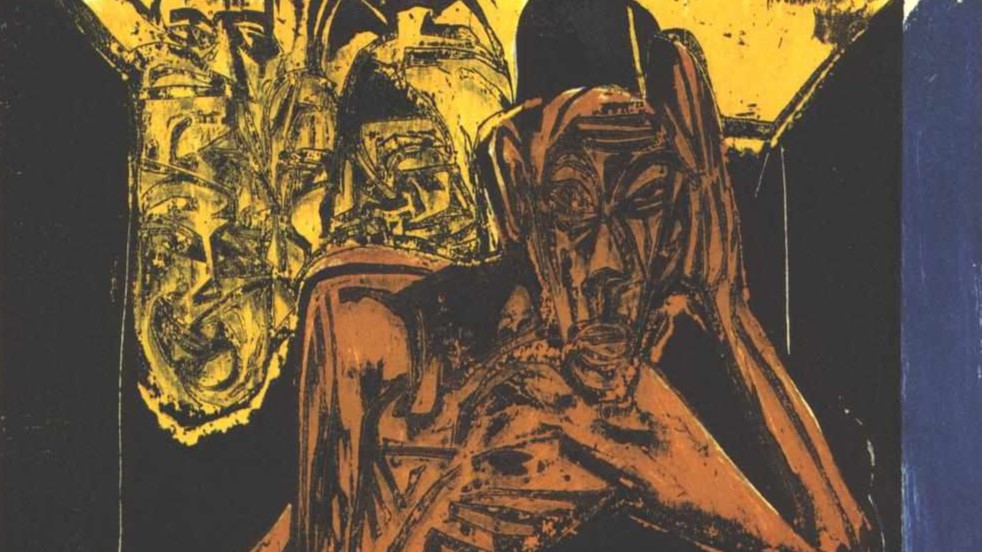
Psalm 41:7-10
Narrative Lectionary 129
7 AllA who hateB me whisperC togetherD about me;
they imagineE the worstF for me.
A “all” = kol. From kalal (to complete). This is all or every.
B “hate” = sane. This is to hate, an enemy. It is a personal hatred and not an abstract one.
C “whisper” = lachash. 3x in OT. This is to whisper or charm i.e. murmur a spell like a magician does.
D “together” = yachad. From yachad (to join, be united). This is a unit, both, altogether, unitedness, alike.
E “imagine” = chashab. This is properly to braid or interpenetrate. Literally it is to create or to wear. Figuratively, it can mean plotting – generally in a negative sense. More broadly, this can also mean think, consider, or make account of.
F “worst” = ra’. From ra’a’ (to be evil, bad, afflict; properly, to spoil – to destroy by breaking into pieces; figuratively, to cause something to be worthless; this is bad in a physical, social, or moral sense; that which displeases, to do harm or mischief, to punish or vex). This is bad, disagreeable, that which causes pain, misery, something having little or no value, something that is ethically bad, wicked, injury, calamity. This refers to anything that is not what it ought to be – a natural disaster, a disfigurement, an injury, a sin.
8 They think that a deadlyG thingH has fastenedI on me,
G “deadly” = beliyyaal. From beli (lack, nothing, without, wearing out, failure, destruction); {from balah (to grow old, wear out, waste away, consume, spend)} + yaal (to gain, profit, do good, ascend, be useful or valuable; benefitted). This is lacking profit i.e. worthlessness, destruction, evil, ungodly person, wickedness, or Belial.
H “thing” = dabar. From dabar (to speak, declare, discuss). This is speech, a word, a matter, an affair, charge, command, message, promise, purpose, report, request. It is a word, which implies things that are spoken of in a wide sense.
I “fastened” = yatsaq. This is to pour out, flow, wash away, or overflow. It can imply melting as one does to cast metal. By extension, it can refer to something being steadfast, stiffened, firmly in place.
that I will not riseJ againK from where I lie.L
J “rise” = qum. To arise, stand, accomplish, establish, abide. This is rising as in rising against, getting up after being sick or asleep, arising from one state to another, becoming powerful, or rising for action. It can also be standing in a figurative sense.
K “again” = yasaph. This is to add, increase, continue, exceed.
L “lie” = shakab. This is to lie down, lodge. It is lying for sleep, sex, or other reasons.
9 Even my closeM friendN in whom I trusted,O
M “close” = shalom. From shalam (to be complete or sound; to have safety mentally, physically, or extending to one’s estate; so, if these things are safe and complete, the implication is that one would be friendly; and, if being friendly, one would make amends and that friendship would be reciprocated). This is completeness, soundness, welfare, favor, friend, good health. It is to be safe and figuratively well, happy, at peace, friendly. Abstractly, it includes the ideas of welfare and prosperity (not in excessive wealth, but in having enough).
N “friend” = ish. Perhaps from enosh (human, humankind, mortal); from anash (to be weak, sick, or frail). This is man, husband, another, or humankind.
O “trusted” = batach. This is to hide for refuge, be secure or sure. Figuratively, it refers to trust, being confident, or hoping.
who ateP of my bread,Q has liftedR the heelS against me.
P “ate” = akal. This is to eat, devour, burn up, or otherwise consume. It can be eating in a literal or figurative sense.
Q “bread” = lechem. From lacham (to eat, feed on). This is bread, food, loaf. It can refer to food more generally for people or for animals.
R “lifted” = gadal. This is to grow up, become great, become wealthy – to advance. The root meaning may be to twist in the sense of the process of growing.
S “heel” = aqeb. 13x in OT. This is heel, hind part, hoof, rear guard of an army, one who lies in wait, or usurper.
10 But you, O Lord,T be graciousU to me,
and raise me up,V that I may repayW them.
T “Lord” = YHVH. From havah (to be, become) or hayah (to come to pass, become, be). This is the name of the God of Israel, the self-existent and eternal one, the tetragrammaton. This pronunciation has been lost to time so “Lord” is generally used in its place.
U “be gracious” = chanan. This is to beseech, show favor, be gracious. Properly, it is to bend in kindness to someone with less status.
V “raise…up” = qum. Same as “rise” in v8. See note J above.
W “repay” = shalam. Related to “close” in v9. See note M above.
Image credit: “Shlemiel in the Loneliness of the Room” by Ernst Ludwig Kirchner.
